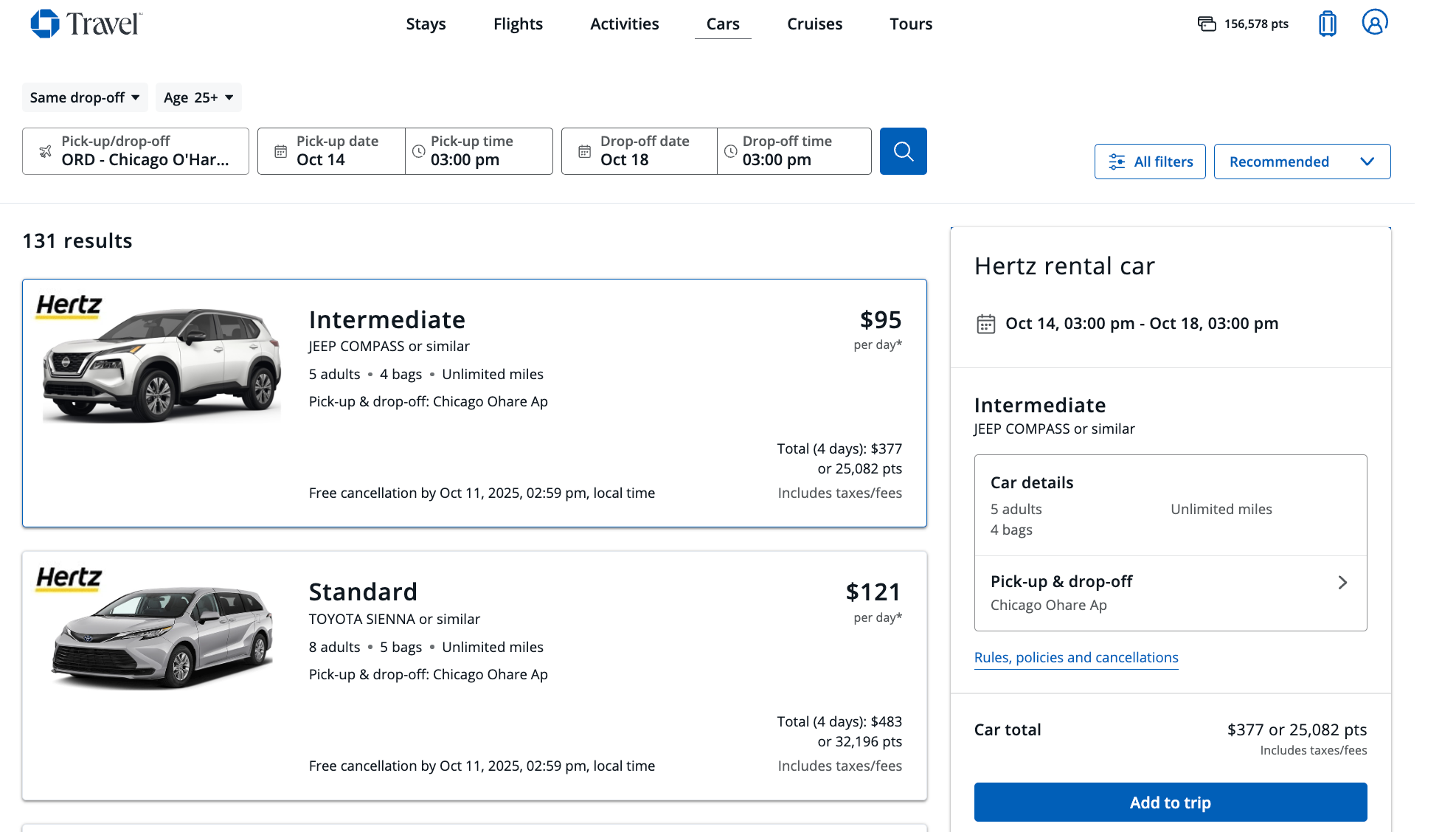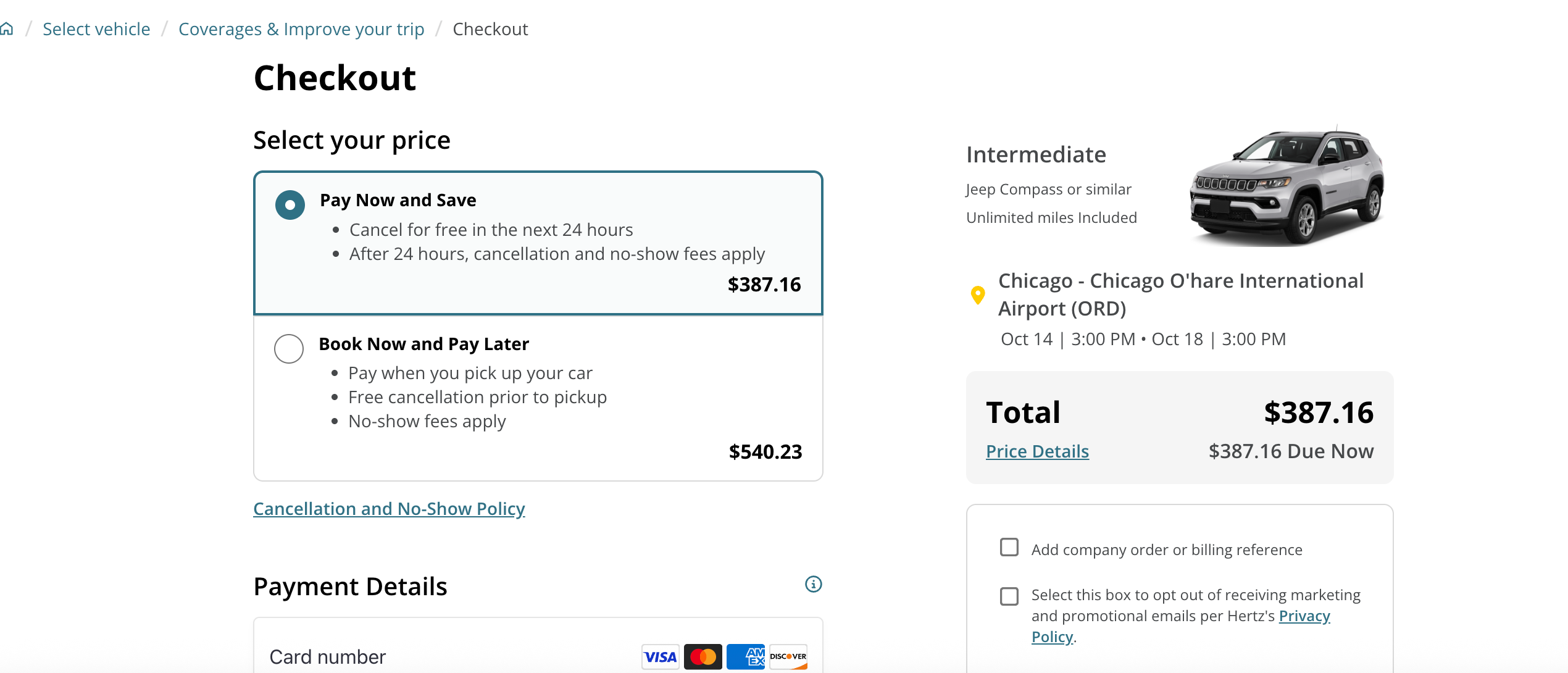
If you rent cars even a few times a year, the Chase Sapphire Reserve® (see rates and fees) or the Chase Sapphire Reserve for Business℠ (see rates and fees) offer excellent benefits.
Both cards earn bonus points on rental cars booked through Chase Travel℠, and cardholders can take advantage of an annual $300 travel credit and excellent insurance coverage.
Here’s what makes a Sapphire Reserve card the best premium card for rental cars, how you can maximize its benefits and what fine print to keep in mind.
Why Sapphire Reserve cards are great for renting cars
This past June saw the launch of the Sapphire Reserve for Business at the same time the Sapphire Reserve was refreshed.
Three key benefits that make the Sapphire Reserve an excellent choice for rental cars include:
- Earning 8 points per dollar spent when you book a car via Chase Travel
- Having access to primary rental car insurance when you decline an agency’s collision damage waiver
- Discounts and perks with Avis, Hertz or National when booking directly

Related: Save money on your next trip: Use these tips to never pay full price for a rental car
Book through Chase Travel for maximum bonus points
Both Sapphire Reserve cards earn 8 points per dollar spent on all Chase Travel purchases, including rental cars. This applies to accounts opened on or after June 23 and for existing cardholders starting Oct. 26.
In my experience, Chase Travel car rental prices are competitive, sometimes lower than other agencies. Based on TPG’s September 2025 valuations, you’ll get about a 16.4% return.

For example, when searching for a rental car in Chicago, Chase offers an intermediate car through Hertz for $95 a day. You’d earn 3,016 Chase Ultimate Rewards points from this booking, worth about $62 based on TPG’s September 2025 valuations.

In comparison, if I book directly with Hertz, the prepaid rate would be about $97 a day; however, the rate to pay later at the counter would be $135 a day. Chase Travel is slightly cheaper, and, most importantly, it offers free cancellation by Oct. 11, whereas the direct booking is nonrefundable after 24 hours.
Before booking with Chase Travel or directly with the rental agency, pay attention to cancellation policies or elite status perks available to you. It can help you determine which channel to book through.
I prefer booking through Chase Travel because the 8 points per dollar earning rate is excellent. Not to mention, the Sapphire Reserve only earns 1 point per dollar spent on all other travel outside of direct airline or hotel purchases, unless you’re an existing cardholder who had an account before June 23. In that case, you’ll earn 3 points per dollar spent on all other travel until Oct. 25.
Maximize the $300 travel credit
Both the Sapphire Reserve and the Sapphire Reserve for Business also offer an annual $300 travel credit. Unlike travel credits from other issuers, Chase’s wide definition of travel makes the credit applicable to any travel purchase, even those outside of Chase Travel.

Just note that you won’t earn bonus points on any amount covered by the $300 travel credit. Last year, I booked a rental car directly with Enterprise in Hawaii, and a few days later, I received my travel credit.
Related: How long does it take to receive statement credits from Amex, Capital One, Chase and Citi?
Stay protected with rental car insurance
Chase offers primary rental car insurance to cardholders of both the Sapphire Reserve and the Sapphire Reserve for Business. You must decline the rental company’s collision damage waiver/loss damage waiver to use the benefit, and coverage only applies to rentals for up to 31 consecutive days.
Having previously purchased rental agency insurance, this benefit saves me between $35 and $60 per day.

Both Sapphire Reserve cards will reimburse up to $75,000 for damages caused by theft or collision to a rental car, and coverage is worldwide. Note that this covers the rental vehicle and won’t cover personal injuries or damages to other vehicles or objects. Both Sapphire Reserve primary car insurance policies have the same list of excluded cars and motorized vehicles, and coverage does not extend to off-roading or if you are under the influence of an intoxicant.
Both cards differ in how the insurance protection benefit is applied. With the Sapphire Reserve for Business, primary car rental insurance only applies to a car rental for commercial or business purposes. If it’s for personal use, the coverage is secondary to any other insurance the primary driver may possess.
As a Sapphire Reserve cardholder, your car rental is covered regardless of whether it is for personal or business use. For New York residents, when renting within the U.S., the coverage is primary unless you have personal car insurance, in which case it’s excess coverage.
Another advantage of primary insurance coverage from a Sapphire Reserve card is that there isn’t an exclusion list of countries. Issuers like American Express have country exclusions for coverage, such as Australia, Italy and New Zealand.
Take advantage of Visa Infinite privileges
Both the Sapphire Reserve and the Sapphire Reserve for Business come with the Visa Infinite designation, giving cardholders additional perks with rental car agencies. These benefits include:
- Avis: Avis Preferred Plus elite status, plus a 30% discount on rentals and a complimentary two-day weekend rental
- Hertz: Ability to fast-track to Hertz Gold Plus Five Star elite status, as well as a 15% discount and a two-hour return grace period for all rentals
- National: Complimentary National Emerald Club Executive elite status and up to a 25% discount on eligible car reservations

Considering the Visa Infinite perks for rental cars, booking directly can be enticing. I’ve activated my benefits as a Sapphire Reserve cardholder and have elite status with Avis and National. Both Sapphire Reserve cards offer a plethora of perks, so be sure to weigh the pros and cons.
Although you’ll get a discount with one of the agencies, compare the price to Chase Travel. If you’re saving significant money and can receive an upgrade, a return grace period or other ancillary benefits, then go for it.
I prefer earning Chase Ultimate Rewards points, so if the price difference is negligible, I would prefer earning 8 points per dollar spent, rather than 1 point per dollar spent.
Related: Hitting the road on your vacation? Everything you need to know about rental car elite status
Bottom line
Both the Sapphire Reserve and the Sapphire Reserve for Business offer high earning rates on rental car bookings, the ability to use a travel credit to offset its cost and industry-leading primary insurance coverage.
If you book rental cars often, consider one of these cards to help you earn plenty of bonus points along the way.
To learn more, read our full reviews of the Sapphire Reserve and the Sapphire Reserve for Business.
Apply here: Chase Sapphire Reserve
Apply here: Chase Sapphire Reserve for Business
Editorial disclaimer: Opinions expressed here are the author’s alone, not those of any bank, credit card issuer, airline or hotel chain, and have not been reviewed, approved or otherwise endorsed by any of these entities.

